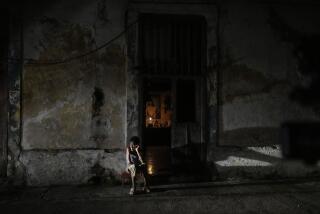Cuba Abandons Construction of Nuclear Reactor
CIENFUEGOS, Cuba — In one of the most painful decisions of a period of headlong decline, President Fidel Castro has announced that Cuba is halting work on a huge nuclear reactor.
Cuba had once hoped that the nuclear plant, which is 90% complete, would fulfill up to one-fourth of the island’s energy needs. The facility is in the town of Juragua, just a half-hour ride from here on the Bay of Cienfuegos.
It was being built with $1.1 billion, largely in aid and subsidies from the former Soviet Union, which had been Cuba’s lifeline over more than three decades of partnership in Marxism-Leninism. Castro said that Russia was not willing to offer the necessary help to continue construction.
“We have no alternative now but to halt the construction of this project,” Castro told a gathering of 80,000 Cubans during a speech Saturday commemorating the revolution that brought him to power.
The breakup of the Soviet Union and the East European Communist alliance three years ago left Cuba adrift, unable to pay for imports in the hard currency its former patrons began to demand.
The nuclear facility had been a training ground for thousands of Cuban technicians and construction workers. Russia is not sending needed supplies, Castro said, and Russian technicians at the plant are demanding cash payments of $300,000 a month.
Castro read from a letter that the Cuban government sent earlier this year to Russia, virtually pleading for assistance for the nuclear plant. The Russians have not agreed to the request for new arrangements more favorable to Cuba, Castro said.
Planning for the Juragua plant began in 1972 with the signing of a Soviet-Cuban accord, Castro said.
Workers who were interviewed said they would put finishing touches on the physical structure, but Castro did not address possible uses of the property. He said construction workers at the plant, which employed up to 7,000 workers, will begin building seafront hotels in a new drive for tourism.
More to Read
Sign up for Essential California
The most important California stories and recommendations in your inbox every morning.
You may occasionally receive promotional content from the Los Angeles Times.









